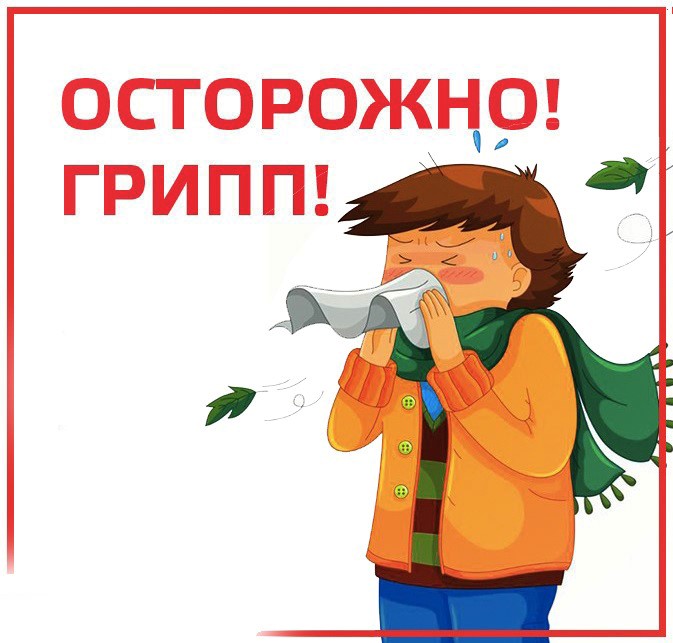Prevention of acute respiratory diseases, influenza and coronavirus infection

Prevention of acute respiratory diseases, influenza and coronavirus infection
Acute respiratory disease (ARI) — is a general name for all types of acute respiratory diseases caused by viral or bacterial infection.
Acute respiratory viral infection (ARI) — a general term for clinically and morphologically similar acute inflammatory diseases of the respiratory tract and lungs caused by viruses tropic to the ciliated epithelium of the respiratory tract. It is the most common group of diseases in the world, combining influenza, coronavirus, respiratory syncytial, rhinovirus, adenovirus and other infections causing catarrhal changes in the respiratory tract (runny nose, cough, sneezing, headache, sore throat, fatigue).
The circulation of respiratory viruses in our region is increasing annually autumn-winter period. The infection is quickly transmitted from person to person by airborne droplets, causing mass morbidity of the population up to her epidemic level. ARVI refers to the number of the most widespread infectious diseases, their the share annually falls to 90-95% in the structure of registered infectious diseases.
Flu — a type of acute respiratory viral infection caused by one of three types of influenza virus (A, B or C). Flu is characterized by a sudden rise in temperature to 39-40°C, severe chills, muscle and headaches, and intoxication. Sore throat and dry cough may occur from the very beginning of the disease. High temperature can last for 3-4 days and be accompanied by delirium, severe headaches, insomnia, neuralgia. This infection is characterized by a particularly severe course, the presence of severe complications (viral myocarditis, damage to the brain, liver, in pregnant women, influenza often leads to thrombosis, gestosis , intrauterine death and loss of the fetus) and can end in death.
Coronavirus infection ( COVID -19) is a potentially severe acute respiratory infection caused by the SARS-CoV-2 coronavirus . It can occur in the form of a mild acute respiratory viral infection or in a severe form. The most common symptoms of the disease include fever, fatigue, and dry cough. The most common complication of the disease is viral pneumonia, which can lead to acute respiratory distress syndrome and subsequent acute respiratory failure. Complications include multiple organ failure, septic shock, and venous thromboembolism.
Prevention of acute respiratory viral infections, including influenza and coronavirus infection, involves a set of measures aimed at strengthening the body's defenses and limiting contact with the source of infection.
All preventive measures can be divided into specific and non-specific.
Non-specific prevention – these are methods of prevention aimed at increasing the protective (reactive) forces of the body to counteract respiratory viruses penetrating the human body. Non-specific prevention is carried out both in the pre-epidemic period and directly during the period of epidemic increase in morbidity.
During the period of increased incidence of acute respiratory viral infections, including influenza and coronavirus infection, The following current recommendations must be followed:
- avoid close contact with people who have symptoms of acute respiratory disease;
- if possible, minimize visits to public places or limit the time spent in them;
- use a mask if necessary;
- observe hand hygiene (wash hands with soap and water or use hand sanitizers);
- ventilate the premises as often as possible and carry out wet cleaning if necessary;
- observe "respiratory etiquette";
- treat common items with disinfectants;
- use bactericidal air recirculators in places where large numbers of people congregate, especially in small spaces;
- adhere to the principles of a healthy lifestyle: adequate sleep, balanced nutrition, physical activity, regular walks in the fresh air.
"Respiratory Etiquette" – a set of simple rules of conduct aimed at limiting the spread of respiratory diseases, which includes the following measures:
- when coughing and sneezing, you must use a handkerchief, preferably disposable paper handkerchiefs, which are thrown away immediately after use;
- if you don’t have a handkerchief, sneeze and cough into your elbow, not into your palms;
- try not to touch your face with unwashed hands.
Masks People with signs of respiratory diseases and those caring for sick people should wear them first. It is also recommended to use masks when visiting public places. Preference should be given to disposable masks. The mask should not be used for more than two hours. The mask should be replaced immediately if it gets wet (moistened), even if less than two hours have passed since use. Disposable masks cannot be reused.
Formation specific immunity against influenza viruses and coronavirus infection is achieved by early vaccination (before the epidemic), which is especially recommended for vulnerable groups of the population. For influenza, these are pregnant women, children aged 6 months to 5 years, people over 65 years old, people with chronic health problems, and healthcare workers. Vaccination against COVID-19 is necessary for people with chronic diseases and people with immunosuppression , people over 60 years old, and people who are and work in institutions with a 24-hour stay regime.
Vaccination not only dramatically reduces the incidence rate, but also significantly softens the course of the infection, prevents the occurrence of severe complications and deaths. Immunization against influenza and coronavirus infection is carried out before the start of the epidemic season (optimal dates are September-November) so that by the beginning of the epidemic spread of the infection, a person has formed an immune response to the administered drug. After vaccination, antibodies in the body of the vaccinated person appear after 12-15 days.
Flu vaccines are produced for each season, they include current strains of influenza viruses (at least 3), the circulation of which is predicted annually by the World Health Organization. The composition of the vaccine against COVID -19 in the 2024/2025 season has also been updated and includes the glycoprotein of the Omicron HBV virus, which allows for the highest level of protection against diseases and COVID -associated deaths.
Vaccination has a number of contraindications: allergic reactions to vaccine components - chicken protein, allergic reactions to a previous vaccination, acute febrile conditions or exacerbation of a chronic disease. Residual effects of a previously suffered acute respiratory disease (nasal congestion, cough, etc. in the absence of fever) are not a contraindication for vaccination, but the final decision on its appropriateness should be made by a doctor at an in-person appointment.
Prevention of acute respiratory viral infections, flu and coronavirus infection is the key to maintaining health. The main thing is to approach this matter with full responsibility and not to forget about simple rules that allow you to protect yourself and your loved ones from infection. Rational nutrition, a healthy lifestyle, hardening and active sports will increase the body's resistance to colds and prevent the occurrence of many other health problems.
Take care of yourself and your loved ones.





































